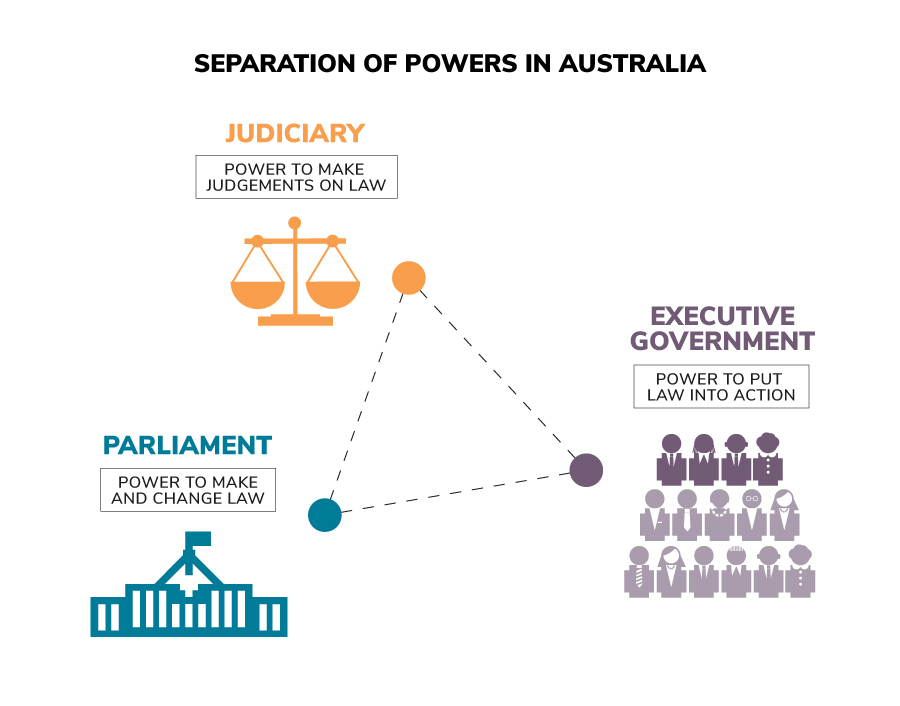Rule of law
The rule of law is a key feature of Australia’s democracy and legal system. This fact sheet explains the principle of the rule of law and its relationship to the separation of powers.
What will I learn?
- The rule of law is the principle that all people are equal before the law and must obey it.
- The rule of law helps to create order and ensure fairness in society.
Curriculum alignment
Year 7 ACHASSK195
What is the rule of law?
The ‘rule of law’ is the principle that all people are equal before the law and must obey the law. The rule of law means that laws apply to everyone, including the people that make them. To make sure everyone knows the law and their rights, laws should be easy to find out about, easy to understand and enforced.
The rule of law is a key feature of Australia’s democracy and legal system. The rule of law is established in covering clause 5 of the Australian Constitution, which states that all the laws made by the Australian Parliament apply to everyone in Australia.
Elements of the rule of law
Although most Australians agree on a broad definition of the rule of law, there is debate about what else should be included in the definition. Some features of Australia’s legal system that are generally considered to be part of the rule of law are:
- Everyone is innocent until proven guilty in a fair and public trial—this is known as the ‘presumption of innocence’.
- People can only be punished if a court has decided they have broken the law.
- A person can only be found guilty of committing a crime if their actions were illegal at the time. Retrospective laws – laws that change what was legal or illegal in the past – should not be created.
- The government can be challenged about its actions through the courts and by the media and citizens.
An important part of the rule of law is reviewing, updating and removing laws to make sure they are fair and reflect social values. The Australian Law Reform Commission is an independent agency that provides recommendations for law reform to the Australian Government.
Relationship with the separation of powers
Separation of powers in Australia.

Parliamentary Education Office (peo.gov.au)
Description
This diagram illustrates the separation of powers in the Australian system of government. The Parliament (represented by an icon of Australian Parliament House) has the power to make and change law. The Executive (represented by a group of people) has the power to put law into action. The Judiciary (represented by an icon of a scale) has the power to make judgements on law. The three groups—Parliament, Executive and Judiciary—are connected.
Copyright information
This work is licensed under a Creative Commons Attribution-NonCommercial-NoDerivs 3.0 Unported License.
You are free to share – to copy, distribute and transmit the work.
Attribution – you must attribute the work in the manner specified by the author or licensor (but not in any way that suggests that they endorse you or your use of the work).
Non-commercial – you may not use this work for commercial purposes.
No derivative works – you may not alter, transform, or build upon this work.
Waiver – any of the above conditions can be waived if you get permission from the copyright holder.
Separation of powers in Australia.

Parliamentary Education Office (peo.gov.au)
Description
This diagram illustrates the separation of powers in the Australian system of government. The Parliament (represented by an icon of Australian Parliament House) has the power to make and change law. The Executive (represented by a group of people) has the power to put law into action. The Judiciary (represented by an icon of a scale) has the power to make judgements on law. The three groups—Parliament, Executive and Judiciary—are connected.
Copyright information
This work is licensed under a Creative Commons Attribution-NonCommercial-NoDerivs 3.0 Unported License.
You are free to share – to copy, distribute and transmit the work.
Attribution – you must attribute the work in the manner specified by the author or licensor (but not in any way that suggests that they endorse you or your use of the work).
Non-commercial – you may not use this work for commercial purposes.
No derivative works – you may not alter, transform, or build upon this work.
Waiver – any of the above conditions can be waived if you get permission from the copyright holder.
The ‘separation of powers’ is the principle that the power to make and manage laws should be shared between different groups—the Parliament, the Executive and the Judiciary—to avoid one group having all the power.
The rule of law and the separation of powers limit the powers of the Parliament, the Executive and the Judiciary. The Parliament and the Executive must act lawfully and can be held to account by the courts if they don’t. The Australian Parliament cannot judge the limits of its law-making powers—this is the role of the High Court of Australia.
The Judiciary is independent and their decisions are impartial. These decisions are made without the influence of those who make the law (the Parliament) or those whose actions are being challenged in a court (the Executive). In this way the Parliament and Executive can’t gain too much power. This helps protect citizens from the arbitrary – unrestrained or autocratic – exercise of power by the Parliament and the Executive.
Benefits of the rule of law
Some of the benefits of the rule of law are:
- All citizens are treated equally and lawfully which protects citizen’s rights.
- An independent, impartial and transparent judicial system.
- All citizens are free from arbitrary arrest and imprisonment, or standing trial for breaking an unknown law.
- Australia’s democracy is strengthened because laws are made by representatives of the people.
- There is a level of order and predictability in society.
